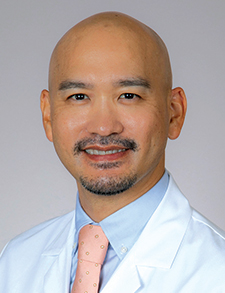
Seiji B. Shibata, MD, PhD – Assistant professor, clinical otolaryngology-head and neck surgery, Caruso Department of Otolaryngology-Head and Neck Surgery, Keck School of Medicine, University of Southern California (USC), Los Angeles; staff physician, USC Verdugo Hills Hospital
Dr. Seiji Shibata earned his medical doctorate and PhD in hearing science from Kansai Medical University in Osaka, Japan, and completed a residency in otolaryngology–head and neck surgery at Kansai Medical University Hospitals. Pursuing further training in the U.S., Dr. Shibata completed a residency in otolaryngology–head and neck surgery and a surgical fellowship in neurotology at the University of Iowa Hospitals and Clinics in 2020. Currently, he sees 60-70 patients per week and performs 120-140 otologic and skull base surgeries per year.
Explore This Issue
August 2024Q: What are the differences when you look at your career now compared to what you imagined it would be when you were a resident?
My career goals were set early on. I wanted to become a clinician–scientist, and I am living my dream. Many people diverge from their original career paths, which is totally fine! The con might be that they may never know what would have transpired with the original plan, but such is life.
Q: How instrumental have mentors been to the success of your academic and professional journeys?
I had several mentors in my path through residency, fellowship, and as an early-stage faculty member. They have all provided me with invaluable clinical, scientific, and academic advice that has been imperative to my success as a clinician–scientist. I maintain close relationships with my mentors through direct interactions at national meetings once or twice a year. We also text message quite a bit.
Q: Do you have any advice for residents negotiating their first contract?
The first contract coming out of residency or fellowship always creates a lot of anxiety. There might not be much that can be negotiated, but it does not hurt to try, especially if it’s something that you feel strongly about. The work environment and colleagues are extremely important. And if a situation does not work, there is no shame in moving on.
Q: What professional activities take a large share of your time?
In addition to seeing patients and performing surgeries, I am also the principal investigator of my basic science research lab. This requires much of my time outside of the clinic and operating room. Obtaining grants, teaching, experiments, and lab management—in addition to the need to publish papers—are difficult to balance but not unexpected. It’s often referred to as the “academic grind”. Although these tasks can be stressful, it is often very rewarding in the end.